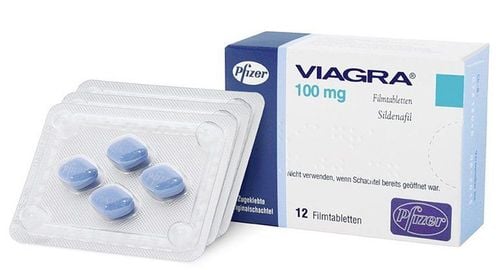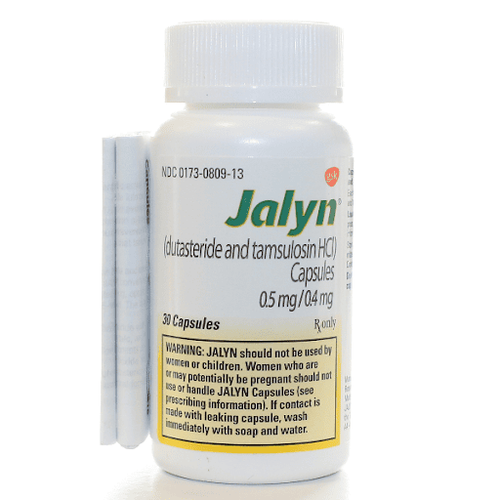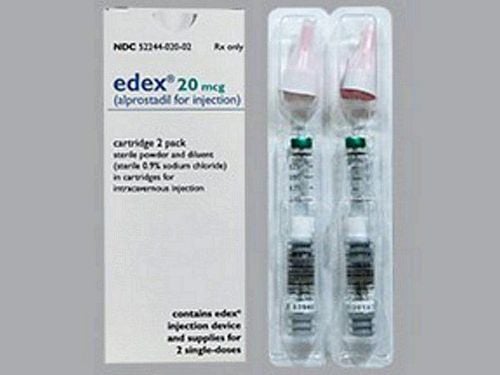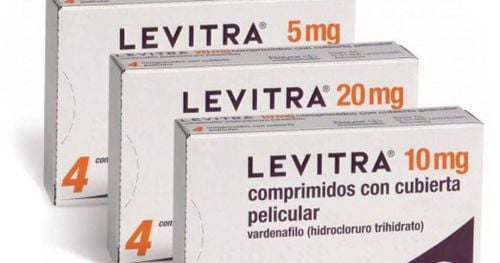This is an automatically translated article.
Posted by Pharmacist Duong Thu Huong - Vinmec Times City International General Hospital
Viagra is a PDE5 inhibitor. PDE5 is an enzyme that promotes the degradation of cGMP in the blood, cGMP regulates blood volume in the penis, so reducing cGMP makes it difficult for men to get an erection. Viagra acts primarily on the circulatory and reproductive systems.
1. What is Viagra?
Viagra (active ingredient name: Sidelnafil) is a characteristic jade green diamond-shaped pill, approved by the FDA for the treatment of erectile dysfunction. Another brand name of sildenafil, Revatio, is used to treat pulmonary hypertension.
Viagra was originally researched by Pfizer as a treatment for high blood pressure and angina. However, in the course of testing, scientists discovered a side effect of the drug that increased the erection of the penis. Pfizer recognizes erectile dysfunction as a physiological disease for which there is no cure, and developing a drug for this indication could be of great benefit to the company. For that reason, Viagra was directed towards research and development to help with impotence in men. The birth of Viagra has brought happiness to many families as well as solved the difficult problem of a part of men in modern society.
2. How does Viagra work?
Viagra is a PDE5 inhibitor. PDE5 is an enzyme that promotes the degradation of cGMP in the blood, cGMP regulates blood volume in the penis, so reducing cGMP makes it difficult for men to get an erection. Through inhibiting PDE5, Viagra relaxes smooth muscle and increases blood flow to the penis, supporting an erection.
Note: Viagra alone does not produce an erection! Although extremely effective in maintaining an erection, Viagra will not work if the body is not stimulated and excited.
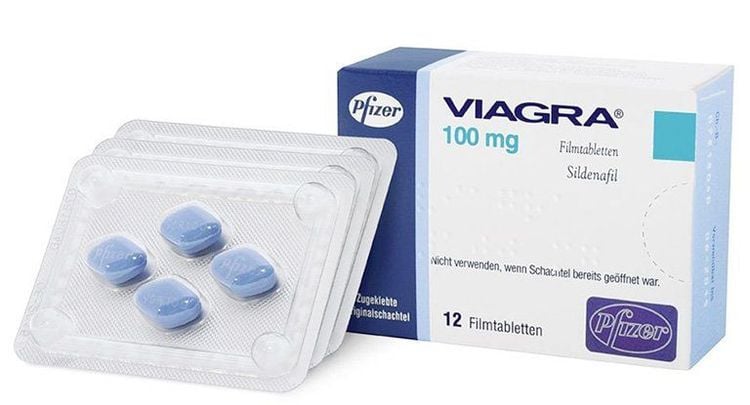
Viagra (tên hoạt chất: Sidelnafil) là viên thuốc hình con thoi có màu xanh ngọc bích đặc trưng
3. How to take Viagra?
Viagra is available in film-coated form, with doses ranging from 25-100 mg. The usual dose is 50 mg, but can be increased or decreased depending on response (note: this dose of Viagra will be different from the dose used to treat pulmonary hypertension of the brand name Revatio, usually 20 mg 3 times. /day).
Viagra can be taken regardless of the meal. Taking Viagra with food may reduce gastrointestinal side effects, but it may take longer for the medication to work. Viagra should be taken 1 hour before sex because Viagra is absorbed quickly into the bloodstream and peaks within 1 hour. Do not take more than 1 tablet per day.
4. The effect of Viagra on the organ systems in the body
Viagra has a major effect on the circulatory and genitourinary systems:
Effects on the circulatory system: Viagra can lower blood pressure, especially after 1-2 hours of taking the drug. If you are already taking blood pressure medication, talk to your doctor before taking it. Do not take Viagra in case of cerebral infarction , myocardial infarction or unstable angina . Effects on the genitourinary system: Viagra's effects usually last 4 hours, and can be longer. In some cases, Viagra can cause life-threatening prolonged erection syndrome (priapism). In case of erection lasting more than 4 hours, it is necessary to seek medical attention immediately for timely treatment. Viagra should not be used in cases of erectile dysfunction caused by penile curvature (Peyronie's disease). There is currently no evidence that Viagra reduces male fertility. In addition to the effects on the circulatory and reproductive systems, Viagra can cause some side effects on the nervous system such as headache, dizziness, flushing, nosebleeds, and gastrointestinal effects such as stomach upset. nausea, vomiting. In some cases, Viagra can cause side effects on the sense of smell such as tinnitus, temporary deafness, or vision loss of vision and color disturbances, especially in people with retinitis pigmentosa (retinitis). pigmentosa). Viagra should not be used in certain other eye conditions such as non-arteritic anterior ischemic optic neuropathy (NAION) because of the risk of blocking blood flow to the optic nerve.

Viagra có thể gây ra một vài tác dụng phụ trên hệ thần kinh như đau đầu, chóng mặt
Drug Interactions:
Do not use or be cautious when using Viagra with drugs containing nitrates, GC stimulators (Guanylate Cyclase stimulator), and blood pressure medications such as long-acting alpha blockers due to the risk of hypotension. Because Viagra is metabolized by the liver, metabolism may be affected by CYP3A4 inhibitors such as some antifungal drugs. Certain supplements can also interact with Viagra. Drinking alcohol does not usually reduce the effectiveness of the drug, but it will make it harder to get an erection. Check with your Pharmacist to see if any of the medications you are taking will affect Viagra.
Unresponsive to medication:
At least 2/3 of men improve erection after taking Viagra, but not all cases are like this. If Viagra is not effective, other physiological causes such as emotional deficits, waiting too long, or insufficient dose should be ruled out. Some drugs can cause erectile dysfunction, decrease libido such as SSRI antidepressants, blood pressure drugs, antihistamines, anti-prostate drugs, etc.
If you don't respond to Viagra, you can try other drugs like Cialis (tadalafil), Spedra (avanafil), Levitra (vardenafil) - which work by the same mechanism as Viagra, or Alprostadil - which work with mechanism such as male hormone replacement. Some non-pharmacological alternative therapies include: vacuum pumps, psychotherapy with a penile sex specialist, and pelvic floor muscle exercise.
Vinmec International General Hospital with a system of modern facilities, medical equipment and a team of experts and doctors with many years of experience in medical examination and treatment, patients can rest assured to visit Examination and treatment of erectile dysfunction at the Hospital.
Please dial HOTLINE for more information or register for an appointment HERE. Download MyVinmec app to make appointments faster and to manage your bookings easily.
Source: Package insert, Update, Healthline




